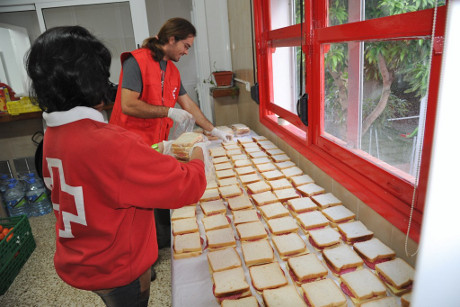As we prepare for the Christmas festivities, maybe an article about poverty is not what many will expect, but maybe it is the most important time to discuss a subject that we are all aware of, but feel helpless to do anything about. At least in the Canary Islands, we can offer a little good news that should have a positive impact upon many people in need.
I sometimes write about both homelessness and food aid in the Canary Islands, which surprises some and annoys those who believe that I should somehow focus my time upon extolling the virtues and beauty of these wonderful islands, and act as an unofficial holiday promoter.
Since I do not work for the tourism industry or am responsible to the island government, I feel that my time is better spent opening the eyes of those who have been seduced by the island dream to what is really going on behind those glossy brochures and slick television advertisements.
Yes, these are wonderful islands to visit, live, work and play, but the unemployment situation is horrendous, particularly for young people, and the lack of affordable housing is at crisis levels, so that we have many residents who are either homeless or relying on food banks to survive.
Despite those glossy brochures and ‘all you can eat and drink’ hotel deals in this ‘alternative island universe’, this is not the reality that many people face each day of their lives.
The Canary Islands are not alone in this shame. Poorly publicised statistics show that between 2013 and 2017, around 230 homeless people died on the streets of Britain. Between 2017 and 2018, 440 people have died, which is almost twice as many in a quarter of the time. How any society can allow this to happen, and how any government can rest easy with these appalling statistics, I do not know.
The good news is that in Gran Canaria, the city of Las Palmas has recently created the first day centre for homeless people with an investment of around 700,000 euros from the Canary Islands Development Fund. This building will be accessible for all as it will have an elevator, stairs and bathrooms especially adapted for people with reduced mobility. This refurbishment project began in 2017 with the first phase of demolition of the interior.
It is hoped that this new facility will open in February 2019, and will be the first day centre for homeless people in the Canary Islands. The day centre will provide a reception area, medical and administrative offices, training rooms, a hairdressing salon, toilets, and bathrooms adapted for people with reduced mobility, as well as an outdoor area that will be used as a rest area.
The first floor will provide a kitchen, a dining room with capacity for 60 people, luggage storage, restrooms and showers for residents, a locker room for staff, offices, a warehouse and a cleaning room. The third floor, which is currently under construction, will see the creation of 34 residential spaces, so that homeless people can spend the night in the new centre.
In another welcome move, the Government of the Canary Islands has received 1,787,000 euros from the European Aid Fund for the Most Disadvantaged, which is the second of three payments to the Spanish Red Cross and the Spanish Federation of Food Banks in the Canary Islands.
The European Aid Fund is jointly funded by the European Union and the Spanish Government and is intended to promote social cohesion, to reinforce inclusion and to contribute to the goal of eradicating poverty.
Food aid is given to various institutions to distribute to the population according to different categories, such as those with low incomes, mothers with new babies, unemployed people, as well as those identified as being within the poverty index. In the Canary Islands, the money allocated to the purchase of food amounts to almost 5,300,000 euros divided into three periods throughout the year.
The ‘food basket’ contains about fourteen products, such as white rice, cooked beans, UHT milk, olive oil, canned tuna, pasta, tinned tomatoes, biscuits, canned green beans, canned fruit in light syrup, powdered chocolate, infant bottles of fruit and chicken, infant cereals and milk powder.
During the early days of the recession, politicians in both Spain and the UK were fond of using placatory phrases, such as “We are all in it together”. Clearly, we are not and never will be. These islands have the potential to be of enormous benefit to all its citizens, and not just the mega hotels and businesses that are often based in other countries and have very little positive impact upon the local economy.
It is with this in mind that I read with interest a recent report from the Government of the Canary Islands that the new tourism strategy for the islands between now and 2025 will contain a commitment to the whole of society, and with the aim of increasing the quality of life for all. Let us hope that this really will be the case, and not just empty words.
If you enjoyed this article, take a look at my websites: http://barriemahoney.com and http://thecanaryislander.com or read my latest book, ‘Living in Spain and the Canary Islands’ (ISBN: 9780995602724). Available in paperback, as well as Kindle editions.
Join me on Facebook: @barrie.mahoney
© Barrie Mahoney





